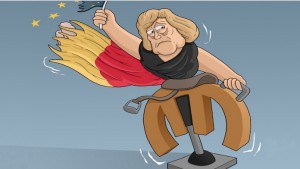Michael Heise writes: The debate about whether Greece should leave the eurozone has revived the idea that Germany, and other similarly strong economies, would best serve the rest of the continent if they exited the monetary union.
Any serious discussion of exit would cause chaos in financial markets. Even more important are the argument’s economic flaws, three of which are immediately apparent. First, the proponents of a German exit argue that if Germany left, the rest of the eurozone would devalue and that this devaluation would restore growth. This is unlikely.
The result of Greece and Spain’s devaluing their currencies in the 1980s was inflation with little growth. It was precisely the painful consequences of their sliding currencies that enticed these countries to join a monetary union with Germany.
Currency devaluation can boost exports in the short term, but it also makes imports more expensive, eroding households’ purchasing power. Workers then demand higher wages to compensate. The result is often a wage-price spiral that quickly offsets the competitiveness gains of a weaker currency.
Second, advocates of a German exit argue that its economy is too competitive to share a currency with weaker players. Flattering but wrong. Since 2000, France’s cumulative GDP growth has been the same as Germany’s. Ireland and Spain have done even better, despite the deep slumps they had to endure during the crisis.
Competitiveness does not depend only, or even primarily, on the exchange rate. Fundamentals such as productivity, education, research and development, and the tax system are more important. In these areas, Germany is far from being in a league of its own.
To be sure, the eurozone does not fully meet all of the conditions of an optimal currency area (which include an open and diversified economy, free movement of capital and labor, and flexible prices and wages). But, although the eurozone certainly has plenty of room to improve, the crisis has brought much progress in terms of integration and flexibility. The eurozone may not be perfect, but it is good enough to last.
One of the most important – but often ignored – conditions for a successful currency union is its members’ ability to agree on certain fundamentals of economic policy. Most notably, countries must agree that it is the private sector, rather than the state, that is responsible for creating jobs, and that sustainable economic growth requires open product and labor markets.
In the case of Greece, these fundamental ideas do not appear to have been universally accepted.
Greek wages and prices have already fallen sufficiently to restore competitiveness; the country now needs a framework in which private economic activity can thrive.
The eurozone’s survival requires, first and foremost, that all of its member countries have strong and flexible economies, which means that all of them must undertake continuous efforts to remain competitive.

